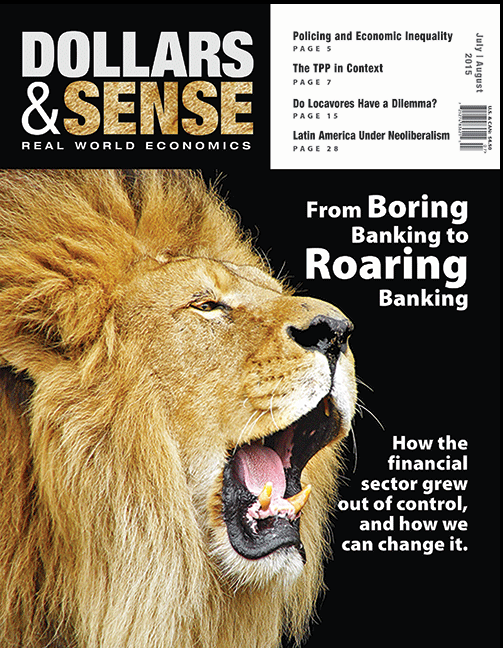3 min read

Our July/August issue is out! We have posted two articles: our cover feature, an interview with Gerald Epstein of UMass-Amherst: From Boring Banking to Roaring Banking; and John Miller's "Up Against the Wall Street Journal" column, Trans-Pacific Partnership: Corporate Power Unbound.
Here is the issue's p. 2 editorial note:
Harvard economics professor Gregory Mankiw, writing in a recent New York Times “Economic View” article, for example, declares the case for “free trade” a “no brainer” among economists. Mankiw engages in the usual sleight of hand: slipping seamlessly from the benefits of international trade, to the desirability of “free trade” policies (deregulating international trade), to support for contemporary “free trade” agreements (which are primarily focused on deregulating international investment and finance, not trade in goods). We might agree that this is a “no brainer,” but not in the sense Mankiw means. The argument is convincing as long as you don’t actually think about it.
In this issue of Dollars & Sense, we have several examples of similar justifications.
Economists Anita Dancs and Helen Scharber take a look at the criticisms of the “local food” movement coming from mainstream economists. Here, the economists’ main case for a “10,000 mile diet” (as one recent book put it) is actually quite similar to the one for “free trade”—based on what Dancs and Scharber call the “CASTE paradigm.” Comparative Advantage, economies of Scale, and Trade, the mainstream economists claim, lead to greater Efficiency. While Dancs and Scharber don’t think that “locavores” have got it quite right, they emphasize that the existing food system is hardly the result of markets untouched by government intervention (subsidized water, anyone?) and that, in any case, unfettered markets would not lead to socially efficient or equitable results.
Gerald Epstein takes us into the world of high finance, and the transition from regulated “boring” banking (from the New Deal to the Reagan Revolution) to the terrifying “roaring” banking of the post-deregulation era. Again, economists claimed that financial deregulation and innovation (like new-fangled securities) were going to deliver vast benefits—fueling new productive investment, making it easier for people to save for retirement, helping families and businesses manage risk, and so on. (More than a few of the economists who made such arguments had undisclosed ties to the big financial firms themselves.) How did that work out for us?
In the “Economy in Numbers,” Raul Zelada Aprili and Gerald Friedman look at the consequences of so-called “Washington Consensus” economic policies (or “neoliberalism”) in Latin America. Mainstream economists and the politicians they advised took advantage of the Latin American debt crisis of the 1980s to discredit the government “import substitution industrialization” policies of the 1950s-1970s—and to push for a profound “free market” restructuring of the region’s economies. In fact, economic growth was significantly faster during the import substitution era than during the heyday of neoliberalism—and has accelerated in the last decade, as governments across the region have turned away from neoliberal policies.
The thing that we need to keep in mind is that, though “neoliberalism” may sound like a belief system—the word does end in “ism,” after all—it is really more than that. It describes a set of economic policies or institutions. The ideology of neoliberalism, the unflinching belief in “free markets” everywhere and for everything, lays atop the interests of global capital. Claims that financial deregulation would benefit us all—and the imperviousness of finance to significant reform in the wake of a disastrous crisis—reflect the political power of what Epstein calls the “bankers’ club.” The CASTE paradigm, likewise, is not just a set of fallacious arguments, but a defense of the existing distribution of power in the food system and in society more generally.
That’s what we need to realize. They’re not really pulling our leg. More like twisting our arm.
---
